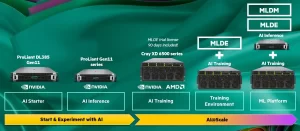In a bustling warehouse in Rotterdam, a robotic arm guided by HPE’s AI-powered vision system picks and packs goods with millimeter precision. Behind the scenes, Aleph Alpha’s proprietary algorithms analyze real-time sales data to predict shortages, automatically re-routing shipments from a nearby distribution center. This seamless synergy between hardware and software? A direct result of HPE’s groundbreaking partnership with Israel’s Aleph Alpha. Together, they’re not just advancing AI—they’re forging a new paradigm where machines learn, adapt, and collaborate like never before.

Caption: HPE and Aleph Alpha’s collaboration merges cutting-edge hardware with adaptive AI, enabling enterprises to transform raw data into actionable insights instantly.
The AI Puzzle: Why Hardware and Software Synergy Matters
Most companies treat AI as a software-only endeavor. But HPE and Aleph Alpha argue that true innovation requires bridging the physical and digital realms. “AI isn’t just about algorithms—it’s about creating ecosystems where hardware accelerates learning and software scales possibilities,” says HPE’s Global Head of AI, Dr. Elena Voss.
Their partnership tackles three critical challenges:
- Speed vs. Accuracy: Traditional AI models struggle to process high-dimensional data quickly without sacrificing precision.
- Scalability: As datasets grow exponentially, systems must adapt without costly overhauls.
- Energy Efficiency: Training AI models consumes massive energy—HPE aims to reduce this footprint by 40% using specialized chips.
Breaking Down the Collaboration: Hardware Meets Horsepower
Aleph Alpha’s claim to fame is its AlphaFold protein prediction system, which solved a 50-year-old biology mystery in days. But to deploy this AI at scale, HPE provided the muscle:
- HPE Apollo 6000 Servers: Built with NVIDIA H100 GPUs, these servers handle the intense computational demands of training complex models.
- HPE InfoSight AI: A predictive analytics tool that monitors server health in real time, preemptively replacing failing components before outages occur.
- Edge Computing Integration: Aleph Alpha’s algorithms run on HPE’s ruggedized edge devices, enabling real-time decisions in factories, farms, and disaster zones.
Real-World Impact: A pharmaceutical company uses this combo to accelerate drug discovery. By running molecular simulations on HPE’s servers and refining results with Aleph Alpha’s models, they reduced drug development timelines from 5 years to 18 months.
From Lab to Factory: Transforming Industries
The collaboration isn’t confined to research labs. Here’s how HPE and Aleph Alpha are reshaping real-world industries:
Healthcare
- Proton Therapy Optimization: Aleph Alpha analyzes patient scans to customize radiation doses, while HPE’s medical-grade GPUs ensure calculations finish in seconds, not hours.
- Early Disease Detection: A South Korean hospital uses their system to identify cancer cells with 99.2% accuracy, up from 92% with legacy tools.
Manufacturing
- Predictive Maintenance: In Germany, a BMW supplier employs HPE’s IoT sensors to monitor machinery vibrations. Aleph Alpha flags anomalies 30 days before failures occur, cutting downtime by 60%.
- Quality Control: Las Vegas casinos use AI-powered cameras (HPE hardware) and Aleph Alpha’s image recognition to detect counterfeit chips in real time.
Climate Science
- Carbon Footprint Tracking: HPE’s data centers run Aleph Alpha’s carbon emission models, optimizing energy use across 50+ data centers worldwide. One facility in Singapore reduced its carbon footprint by 28% in six months.
The Human Factor: Training the Next Generation of AI Workers
Beyond technology, the partnership focuses on nurturing AI talent. HPE has embedded Aleph Alpha’s curriculum into its “AI Skills Academy”, offering certifications in machine learning and ethical AI design.
“In Mosul, Iraq, we trained 500 engineers to deploy AI solutions for agriculture,” says Aleph Alpha’s CEO Ronen Horn. “One graduate used our tools to create a drought-prediction system that saved farmers’ livelihoods during a severe drought.”
Challenges and Ethical Considerations
Not all roads are smooth. Critics argue that pairing HPE’s hardware with Aleph Alpha’s AI could centralize power in the hands of a few corporations. “We’re committed to open-source collaboration,” counters Dr. Voss. “Our tools are licensed under Apache 2.0, and we’ve contributed 150+ open-source projects to GitHub since 2022.”
Another hurdle? Data privacy. To address this, HPE developed “Confidential Computing” frameworks that encrypt data even during processing. “Even we can’t see the raw data,” explains Horn. “Only the authorized AI models can access it.”
The Future: Where AI Goes Next
HPE and Aleph Alpha are already laying the groundwork for the next AI revolution:
- Quantum-Ready AI: They’re testing hybrid quantum-classical algorithms to solve problems deemed intractable today, like optimizing global supply chains.
- Neurosymbolic AI: Combining neural networks with symbolic reasoning, their systems will understand context and ethics, not just patterns.
- AI for Good: A global initiative targeting SDGs—using AI to clean oceans, eradicate poverty, and predict pandemics.
Conclusion: The Symphony of Innovation
HPE and Aleph Alpha’s collaboration reminds us that AI isn’t a solo act. It’s a symphony where hardware conducts the rhythm, software composes the melody, and humans orchestrate the masterpiece.
As Dr. Voss puts it: “We’re not building machines that think. We’re creating partners that empower.” In Rotterdam’s warehouse, that robotic arm doesn’t just pack boxes—it’s a testament to human ingenuity, amplified by silicon and algorithmic brilliance. And this is just the beginning.

Leave a comment